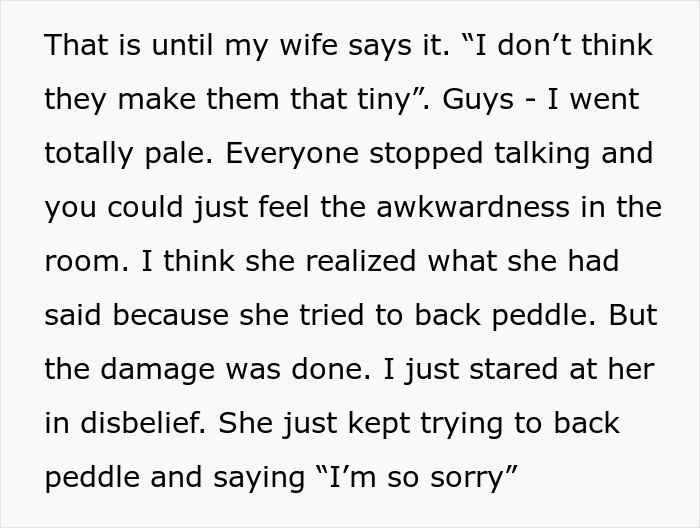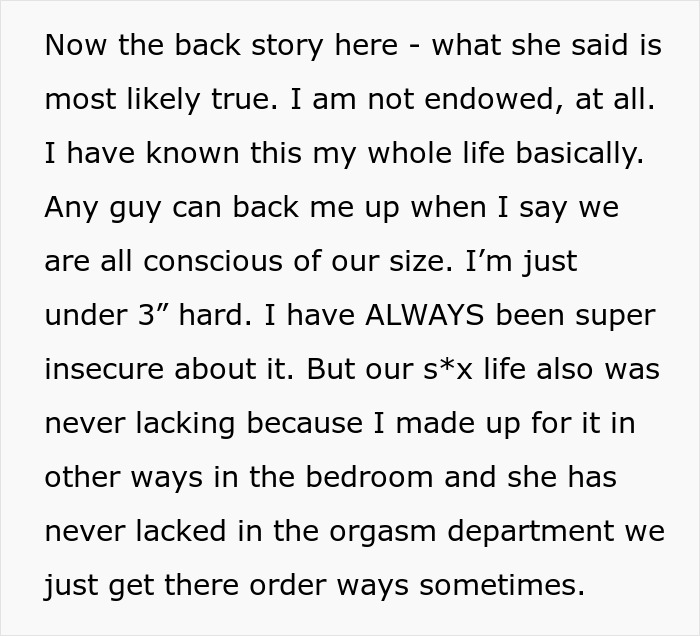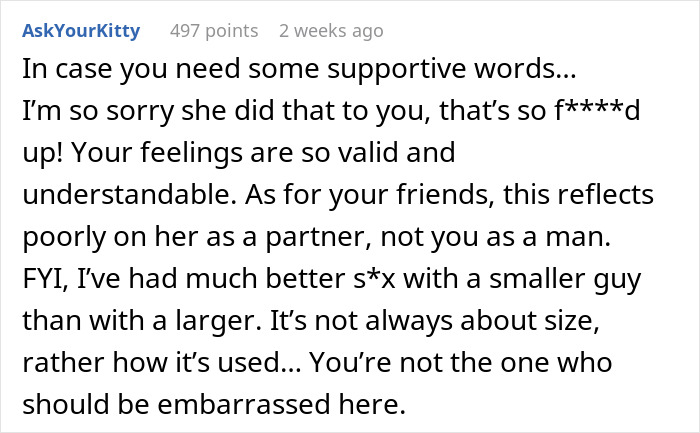Many people have insecurities about their bodies, and they don’t go away once you’re in a relationship. For men, these insecurities sometimes take the form of the size of their private parts. In 2015, researchers surveyed 15 521 men worldwide and found that only 55% of men felt satisfied with the size of their manhood.
For this man, the worst part was that his wife put his body insecurity on display for his friends. One night during a group dinner, she loudly joked about how “tiny” his private parts are. Feeling violated and humiliated beyond compare, the husband even started considering divorce.
To know how couples should proceed in a situation like this, Bored Panda sought the expertise of clinical sexologist and licensed marriage and family therapist Dr. Stephanie Bathurst. She explained how such non-constructive criticism impacts relationships and why comments like these rarely have to do with actual body dissatisfaction. Read her expert insights below!
More info: Bathurst Family Therapy | Facebook | Instagram
A man started considering divorce after his wife told an offensive joke at dinner with friends

Image credits: Fox / Pexels (not the actual photo)
She referred to his manhood as “tiny”, and the husband felt so violated he could do nothing but leave




Image credits: cottonbro studio / Pexels (not the actual photo)





Image credits: Guillaume Issaly / Unsplash (not the actual photo)




Image credits: Jumpy_Discipline5926
What made him more anxious was that she possibly had talked like this behind his back before


Image credits: Sander Sammy / Unsplash (not the actual photo)
Such belittling comments can ruin a relationship irreparably if the wife doesn’t take action quickly
Relationships and intimacy therapist Stephanie Bathurst, Ph.D., says that experts call these types of comments towards your spous non-constructive criticism. “Whether this was a moment of unfiltered expression or an intention to hurt a partner, the impact is incredibly destructive to the attachment security,” she explains.
She cautions that, unless repaired quickly, belittling comments towards a partner, especially if made publicly, can create a domino effect that might result in a divorce. She lists some possible consequences to shaming a partner’s body.
- It conditions negativity not just to the sexual relationship but the relationship in [its] entirety. Once either partner develops a negative perspective, rates of separation are profoundly higher.
- It amplifies anxiety, which can actually worsen sexual performance issues like erectile dysfunction, anorgasmia, etc.
- It breeds mistrust of information. When you misuse information that was vulnerably shared [with] you by a partner as an emotional weapon, vulnerability in the relationship gets locked down out of self preservation. That means no more free-flowing emotional intimacy, psychological intimacy and perhaps even a block on intellectual intimacy.
If the wife truly wants to repair the relationship, she needs to take full responsibility for her words and the hurt that they’ve caused. Dr. Bathurst says that she should process why she said such a thing in front of other people before speaking with her husband. Also, she should consider what she’s going to do to make sure this doesn’t happen again.
“Trust is nothing more or less than 1) Consistent matching of verbal promises made with observable changes, and 2) A partner’s decision to forgive and move forward,” the sexologist explains.

Image credits: Getty Images / Unsplash (not the actual photo)
“These situations very rarely have to do with actual body dissatisfaction,” sexologist Dr. Stephanie Bathurst tells Bored Panda
Dr. Bathurst has been working as an intimacy therapist for more than 15 years. She says that when one partner makes comments like the wife in this story did, it’s not about her dissatisfacti with her husband’s size per se.
“The average female [private] cavity ranges from 2-5 inches, which is smaller than most erect [male private parts],” the sexologist explains. So, when a person comments on their partner’s private parts, it’s usually about unexpressed pain, frustration, or underlying resentment. The size of the body part is merely the context through which the wife filtered out her emotion.
“The first question I would ask the wife is, ‘Where is all of this anger and negativity coming from? When did it start?’,” Dr. Bathurst says. “To prevent this from happening again, we must first identify what purpose this was serving her and what the underlying need is.”
However, if it really is a size-related issue, Dr. Bathurst usually asks couples to focus on sensory thresholds. “Think about it like going to a movie theatre,” she suggests. “Some people enjoy the experience when it’s loud and booming, packed with people, candy, popcorn, hot dogs and soda in hand.”
“For others, to enjoy a movie they need to be in a comfortable chair with a warm blanket, minimal people in the room and not have to wear headphones. [Intercourse] is the same,” the therapist says. “For some women, they need to feel a certain amount of pressure and stimulation in the pelvic floor to amplify sensation.”
Although people like to throw around the term ‘narcissist’ these days a lot Dr. Bathurst says real narcissm is a lot more rare. “Hurtful behavior within a romantic partnership is present because it is serving a purpose,” she says. “Although the behavior is certainly not justified, we see it as a strategy that was used to poorly communicate some important things.”
“She violated your boundaries and humiliated you,” the commenters gave their verdict















Others, however, thought he was blowing this out of proportion: “Nobody cares but you”





A few days later, the husband posted an update about how the conversation with his wife went

Image credits: Gabriel Ponton / Unsplash (not the actual photo)







Image credits: Jumpy_Discipline5926
People wished the couple good luck: “I hope things work out”













